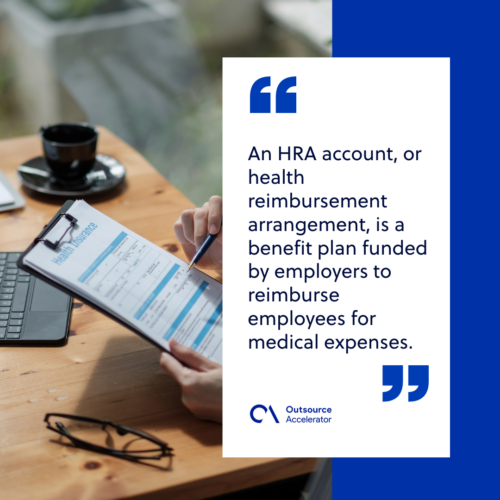HRA vs. HSA: What’s the difference?

Healthcare can be expensive for average workers. In the US alone, individuals could spend hundreds and thousands of dollars to get treated.
Total healthcare spending in the country has reportedly topped US$4.3 trillion in 2021. Thirty-one percent of this spending is on healthcare services.
One of the ways to save money on huge medical expenses lies in their focused savings and spending accounts.
The health reimbursement arrangements (HRA) and health savings accounts (HSA) offer tax advantages and help individuals cover medical costs. However, each has distinct features that set them apart.
Explore the intricacies of HRA vs. HSA accounts, their pros and cons, and key differences in this article.
What is an HRA account?
An HRA account, or health reimbursement arrangement, is a benefit plan funded by employers to reimburse employees for medical expenses.
With an HRA, the employer sets aside a specific amount of money that employees can use to cover qualified healthcare expenses. These expenses include doctor visits, prescription medications, and other medical services.

Pros and cons of an HRA account
An HRA account offers benefits and disadvantages to an individual, including the following.
Pros of an HRA account
- Tax advantage. The funds contributed by the employer are not counted as taxable income, providing a tax advantage for employees.
- Employer contribution. Employees do not need to contribute to the account themselves, making it a valuable benefit.
Cons of an HRA account
- Use-it-or-lose-it. HRA funds can be subject to a “use-it-or-lose-it” policy, depending on the company policy. Any unused funds at the end of the year do not roll over unless granted by the employer.
- Employer control. HRA accounts are usually controlled by the employer. Employees who change jobs may lose access to their remaining HRA funds.
What is an HSA account?
An HSA or health savings account is a personal savings account that individuals can use to save for healthcare expenses.
HSAs are available to staff enrolled in a high-deductible health plan (HDHP). With an HSA, individuals can contribute pre-tax dollars into the account to cover qualified medical expenses.
Pros and cons of an HSA account
Here are the primary pros and cons of an HSA account.
Pros of an HSA account
- Triple tax advantage. HSAs offer a triple tax advantage. Contributions to the account are tax-deductible, the funds in the account grow tax-free, and withdrawals for qualified medical expenses are tax-free as well.
- Portable and personal ownership. The individual owns HSA accounts. Self-employed and currently unemployed individuals may get this account if they meet the eligibility requirements for having one.
Cons of an HSA account
- Health plan requirement. Apart from HDHP, individuals must not be enrolled in another health plan and Medicare to qualify for an HSA account. This may limit eligibility for some individuals with existing plans at hand.
- Contribution limits. There are annual contribution limits for HSAs that individuals must adhere to, and non-medical withdrawals may be subject to taxes and penalties.

HRA vs. HSA: Key differences
In a nutshell, the key differences between HRA vs. HSA can be identified with the following aspects.
HRA vs. HSA: Account ownership
One significant difference in HRA vs. HSA is the ownership of funds.
In an HRA, the employer owns and controls the funds, while employees can access them based on the employer’s guidelines.
However, with an HSA, the account is owned by the individual. The funds in the account remain with the individual even with job changes or insurance plan transitions.
HRA vs. HSA: Eligible medical expenses
Another important distinction lies in the eligible medical expenses each account covers.
HRA accounts typically cover various qualified expenses, including the following.
- Alcoholism treatment
- Flu shots
- Travel expenses for treatments
- At-home tests and treatments
However, HSAs have a slightly broader scope, as they also cover certain expenses not typically covered by HRAs. This includes birth control treatments and acupuncture sessions.
HRA vs. HSA: Health plan requirement
To be eligible for an HRA, individuals must be enrolled in an employer-sponsored health plan that offers the HRA benefit.
Conversely, to have an HSA, individuals must be enrolled in an HDHP. This requirement means that not everyone may qualify for an HSA, while HRAs are generally more widely available.
HRA vs. HSA: Which is better for you?
The choice between HRA vs. HSA depends on various factors, including your employment situation, health insurance coverage, and personal preferences.
Here are a few considerations to help guide your decision.
An HRA is a good fit for employer-funded benefits and flexible spending arrangements. The tax advantages and employer contribution can make it an attractive perk for future in-house and remote employees.
On the other hand, an HSA may be the better choice for freelancers, remote contractors, and staff looking for better control over their medical funds.
Ultimately, it’s important to carefully evaluate a staff’s healthcare needs, financial goals, and eligibility requirements to make the best decision between an HRA and HSA.
Consider consulting with a financial advisor or benefits specialist who can provide personalized insights based on your team’s situation.







 Independent
Independent




